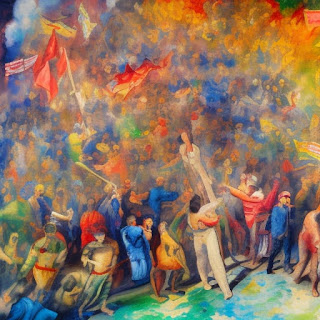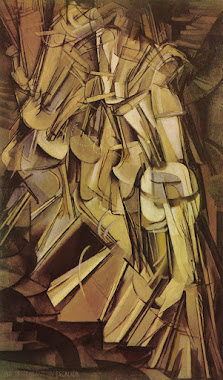The Ethics Of Liberty - "Human Rights" As Property Rights
"human rights, when not put in terms of property rights, turn out to
be vague and contradictory, causing liberals to weaken those rights
on behalf of 'public policy' or the 'public good.' "
I expect you have heard a variety of criticisms anytime you have spoken up for freedom or individual rights. Those criticisms usually consist of claims that no rights are absolute. One common example is you don't have the right to swing your fists in the space taken up by someone else's face. Or they claim you should give up some of your own rights so that others will feel free to do what they want. I call this the, "if I want to go to a concert then everyone else there must wear a mask so I won't get a respiratory virus", example.
Rothbard addresses these criticisms by framing all "human" rights as property rights. By doing so he shows that natural rights don't have to be restricted or lessened to be applied to all of society. Therefore in a libertarian society, people can enjoy absolute freedom by describing all rights as property rights.
The rights that Rothbard focuses on are the right to free speech, assembly, and travel. From the natural law perspective, no one should be able to control another person's speech, location, or movement. An individual owns and controls his own body through the mind/soul/spirit given to him by God.
But there are cases where it looks like individual rights need to be curtailed to work well within a society. One common example is that someone shouldn't yell "fire" in a crowded theater if there is no fire burning. One way to address this issue is to assert that natural rights have limits. At this point you have given up the game of liberty because now any tyrant or busybody has an excuse to call for a limit to your freedom. They will win the argument because there will be no defense by your own logic. The history of Western culture shows this to be true. Bad actors for decades and decades have slowly but consistently whittled away at liberty using exactly this tactic.
In order to win the fight against this creeping tyranny, natural rights must be described within the framework of property rights. Then you can assert that property owners have an absolute right to control their property. Rights to free speech, assembly, and mobility are absolute if considered within an individual owner's property.
Let's start with the issue of the right to free speech.
"the most famous example is Justice Holmes's contention that no one
has the right to shout 'Fire' falsely in a crowded theater, and therefore
that the right to freedom of speech cannot be absolute, but must be
weakened and tempered by considerations of 'public policy.' "
When we think of this issue through the lens of property rights then these limitations are unnecessary. Patrons in a movie theater must abide by the conditions required by the theater owner. He gives you access to come in and watch the movie. But he doesn't allow one customer to disrupt the experience for all the other customers. Once you have violated the rules of the property owner, you can be removed. This isn't a restriction of the customer's right to speech. It upholds the theater owner's right to determine who gets to use his property and how they get to use it. Rothbard quotes Justice Hugo Black to explain.
"We have a system of property, which means that a man does not have
a right to do anything he wants anywhere he wants to do it. For instance,
I would feel a little badly if somebody were to try to come into my house
and tell me that he had a constitutional right to come in there because he
wanted to make a speech against the Supreme Court."
What this means is that a person has the right to use his own property to speak his mind whether that is a music hall, a bar, his home, a radio station, a printing press, or the equipment he owns to make a podcast. No one has a right to keep that person from using his own property to make speech. However, that doesn't give anyone else the right to speak within or by means of that person's property. This further means that a private company can restrict speech on their platform. The complicating factor comes when the state is involved in the decisions about what speech can and cannot be distributed over that platform. Then it is a clear 1st amendment violation even if a private company does the censoring. Companies who follow state commands about how to administer their property is called a governmentality, a term coined by political commentator Michael Rectenwald. It represents a fascist type of interaction where the lines of private organization and government become blurry.
The same logic applies to the right of assembly. Property owners have the absolute right to decide who gets to assemble on their property at what time, in what number, to do what activity. When property is public the issue becomes more abstract because everyone claims that they own the property through paying taxes. But giving everyone the ability to use property at their will is unworkable in space-time reality. Instead, as a "chairman-owner", the state takes the role of property owner to determine who gets to use it. The rules are much clearer in a purely private property system.
In the discussion of property usage, the subset of roads and land applies to immigration. In today's system as the "chairman-owner", the state gets to decide who is allowed to cross the border over public land. In cases where the land contiguous to the border is privately owned the private owner should have the same right.
"There is no question about the fact that current immigration barriers
restrict not so much a 'human right' to immigrate, but the right of property
owners to rent or sell property to immigrants. There can be no human
right to immigrate, for on whose property does someone else have the right
to trample"
That property can be roads, fields, parks, sidewalks, and even social services. As long as the state exists some of that property will necessarily be public property and therefore supervised by the state. That also means the government is "chairman-owner" of national borders and has the right to enact and enforce immigration law. If anyone wants to live in a society that has no "immigration problem" there is only one solution.
"The libertarian society would resolve the entire 'immigration question'
within the matrix of absolute property rights."
The same goes for any other natural right.





What about TikTok? The State of Montana is about to prohibit it from operating within the borders of the state. Does this infringe on TikTok's property rights? How?
ReplyDeleteI have just published an article condemning the state for its actions and insist that TikTok, even though it may be dangerous, poisonous, and nefarious, must be allowed to operate freely. See it here.
https://poorrogersalmanac.com/2023/04/19/montana-the-new-state-of-censorship/
I think the issues with TikTok are over blown. It is unclear how much control the CCP has over it. Plus the same issues exist for all other social media like you say in your article.
DeleteI do think restriction laws violate property rights of both consumer and provider. I am open to some exceptions to doctrinaire libertarianism based on circumstances. But I acknowledge they all open the door to more exceptions and can be dangerous to liberty.